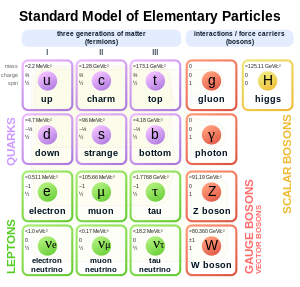
Back Ykboson Afrikaans Eichboson ALS بوزون عياري Arabic Bosón de gauge AST Калібровачны базон Byelorussian Калибровъчен бозон Bulgarian গেজ বোসন Bengali/Bangla Baždarni bozoni BS Bosó de gauge Catalan Eichboson German

In particle physics, a gauge boson is a bosonic elementary particle that acts as the force carrier for elementary fermions.[1][2] Elementary particles whose interactions are described by a gauge theory interact with each other by the exchange of gauge bosons, usually as virtual particles.
Photons, W and Z bosons, and gluons are gauge bosons. All known gauge bosons have a spin of 1; for comparison, the Higgs boson has spin zero and the hypothetical graviton has a spin of 2. Therefore, all known gauge bosons are vector bosons.
Gauge bosons are different from the other kinds of bosons: first, fundamental scalar bosons (the Higgs boson); second, mesons, which are composite bosons, made of quarks; third, larger composite, non-force-carrying bosons, such as certain atoms.
- ^ Gribbin, John (2000). Q is for Quantum – An Encyclopedia of Particle Physics. Simon & Schuster. ISBN 0-684-85578-X.
- ^ Clark, John, E.O. (2004). The Essential Dictionary of Science. Barnes & Noble. ISBN 0-7607-4616-8.
{{cite book}}: CS1 maint: multiple names: authors list (link)
© MMXXIII Rich X Search. We shall prevail. All rights reserved. Rich X Search